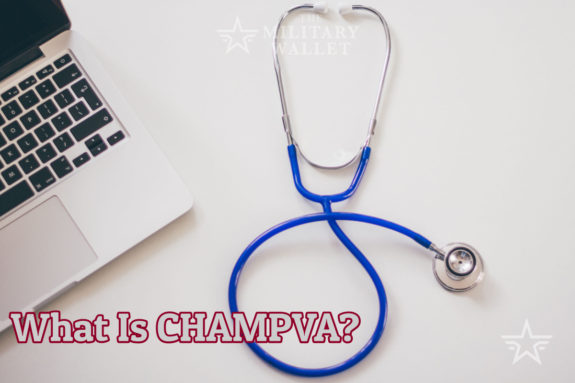The Civilian Health and Medical Program of the Department of Veterans Affairs — more commonly known as CHAMPVA — is a comprehensive, fee-for-service health care program offered by the VA for certain eligible beneficiaries.
Under CHAMPVA, the VA shares the cost of covered services and supplies with beneficiaries who are ineligible for other military-sponsored health plans, such as Tricare. Additionally, this VA-sponsored health care program fulfills the minimum essential coverage requirement for the Affordable Care Act and can be used in conjunction with other health insurance programs, such as Medicare. If used with other insurances, CHAMPVA acts as a “second payer” to cover the costs of approved medical expenses.
Eligibility Requirements
In order to be eligible for CHAMPVA, the beneficiary cannot be eligible for Tricare.
Broadly speaking, CHAMPVA eligibility is extended to family members (spouse, widow/widower or children) of a veteran who:
- Is permanently and totally disabled due to a service-connected disability
- Died as a result of a service-connected condition
- Was rated permanently and totally disabled from a service-connected condition at the time of death or died on active duty
- Whose dependents are not otherwise eligible for Tricare benefits
For those who meet the above criteria and are age 65 and older, there are a few more eligibility criteria for CHAMPVA that pertain to Medicare coverage and whether or not beneficiaries are required to have Medicare Parts A and B coverage.
Additional Eligibility Criteria for Divorce, Remarriage and Child Age Limitations
CHAMPVA has additional eligibility criteria surrounding spouses and children.
Spouses
In general, spouses lose eligibility if they divorce their sponsor or, in the case of widows and widowers, if they remarry prior to age 55. Those who remarry after age 55 are eligible to retain their CHAMPVA benefits.
Children
Children are eligible through age 18, unless they are enrolled in an accredited school as a full-time student. This eligibility must be reestablished each year and ends at age 23, unless the child marries prior to this age. Stepchildren also lose eligibility if they are no longer living in the sponsor’s household.
There is no age limit for children whom a VA Regional Office has deemed is a “helpless child.” The VA defines this as a child who, before the age of 18, became permanently incapable of self-support.
Program Costs
As a fee-for-service insurance program, CHAMPVA pays for most health care services that are deemed medically necessary but requires cost-sharing from participants. This means that beneficiaries pay for a portion of total medical expenses.
The annual outpatient deductible is $50 per beneficiary (or a maximum of $100 per family), and the patient cost share is 25% of the “allowable amount” (which is the maximum amount that the VA will pay for a covered health care service) up to the catastrophic cap, which is currently $3,000 per year.
The cost-sharing rates are largely equivalent to those of Tricare and Medicare, so beneficiaries who have previously been under Tricare coverage are unlikely to see any major variances in their routine medical expenses.
For beneficiaries who have other health insurance, such as Medicare or private insurance, it’s important to keep in mind that CHAMPVA acts as a second payer — meaning that medical bills are initially submitted to the other insurer, and then ultimately to the VA if there is an outstanding balance. In these cases, CHAMPVA pays either 75% of the allowable amount or the balance remainder (whichever is less).
Providers That Accept CHAMPVA Agree to Cost Ceilings in Advance
A final word of wisdom regarding CHAMPVA costs:
Providers that accept CHAMPVA insurance are implicitly agreeing to accept the VA’s allowable amount as payment in full. This means that whatever price the VA sets as the allowable amount for a given service or medical device (say, for instance, an X-ray), the provider agrees to accept. Due to this, a provider who accepts CHAMPVA cannot bill beneficiaries for the balance between their normal rate and the VA’s allowable amount.
For example, if the provider usually charges $100 for an X-ray but the VA’s allowable amount is (a hypothetical) $75, the provider is not permitted to charge the beneficiary the $25 difference. Instead, they have implicitly agreed to charge the $75 CHAMPVA rate.
Program Benefits
Although the CHAMPVA program guide is the best comprehensive resource available that outlines what’s covered (and what’s not covered), some more common medical services that are paid for by CHAMPVA include:
- Ambulance service
- Ambulatory surgery
- Durable medical equipment (DME)
- Family planning and maternity care
- Hospice
- Inpatient services
- Mental health services
- Outpatient services
- Pharmacy (prescription medicines)
- Skilled nursing care (not to be confused with long-term care)
- Transplants

Check your VA Home Loan eligibility and get personalized rates. Answer a few questions and we'll connect you with a trusted VA lender to answer any questions you have about the VA loan program.
Applying for CHAMPVA
In order to apply for CHAMPVA, eligible participants must fill out a form, attach the required documentation (such as Medicare cards or school enrollment letters, if necessary) and mail or fax the completed package to the Veterans Health Administration Office of Community Care in Denver, Colorado, which administers the CHAMPVA program.
Applicants are typically notified of their status within 45 days of mailing their application and will receive a CHAMPVA identification card, as well as a program guide that offers a more in-depth overview of covered medical services and devices.
How CHAMPVA Works
After applying for CHAMPVA and receiving an identification card, beneficiaries are able to locate their own provider that accepts CHAMPVA and schedule an appointment. Following treatment, the provider should submit a claim to CHAMPVA, usually electronically. If a beneficiary has other insurance, such as Medicare, the provider should first submit a claim to the other insurer, after which the remaining balance will be sent to CHAMPVA.
While CHAMPVA beneficiaries usually find their own providers at non-VA clinics and hospitals, there is a way in which some beneficiaries may receive care at VA medical facilities. Through the CHAMPVA in-house treatment initiative, some CHAMPVA beneficiaries may receive cost-free health care services at participating VA facilities that have excess capacity.
The use of services at these facilities allows CHAMPVA beneficiaries to receive care with no out-of-pocket expenses. However, it’s worth noting that the use of VA facilities isn’t possible for those covered by Medicare, since Medicare does not pay for services provided by VA medical centers.
How Tricare and CHAMPVA Are Different
Although differentiating between Tricare, CHAMPVA and other sponsored health insurance programs for military members and veterans can be confusing, the most basic guideline to follow is this:
Those who are eligible for Tricare are not eligible for CHAMPVA.
Tricare is a Department of Defense program primarily intended for active-duty and retired service members and their families. CHAMPVA is a Department of Veterans Affairs program intended for veterans and their family members who are no longer eligible for Tricare benefits. In short, they are completely separate programs for different beneficiary populations. Further, Tricare and CHAMPVA have different governing authorities, claim filing procedures and authorization requirements.
However, one important area in which Tricare and CHAMPVA overlap is in providers. Since CHAMPVA does not have its own distinct network of military providers, participants are instructed to use the Tricare and Medicare websites in order to find participating CHAMPVA providers.




Comments:
About the comments on this site:
These responses are not provided or commissioned by the bank advertiser. Responses have not been reviewed, approved or otherwise endorsed by the bank advertiser. It is not the bank advertiser’s responsibility to ensure all posts and/or questions are answered.
Marie Saqueton says
Thank you for this very informative article. Ny husband is a disabled veteran from the Vietnam war and he uses the VA clinics but I don’t. I pay for my Kaiser card and my Medicare and have never used my CHAMP VA card becaue Kaiser won’t bill them, as they said my card expired when there is no expiration on my card being that I am now 83 yrs. old. So I pay them for everything deductibles and prescription Meds. I think this is unfair for Kaiser to use this alibi. Don’t you think?